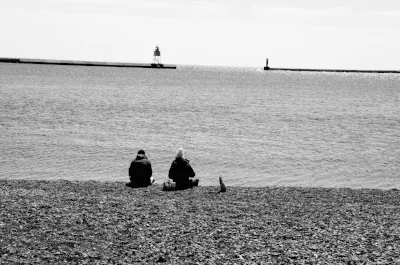Do you remember when you were a kid and you saw one of your teachers at the grocery store? There was this visceral reflex to hide behind the canned goods while stuttering about how wrong it was that he/she was there. Because surely teachers lived at school, right!?!
I don't know about you, but I never really grew out of that reflex. Don't get me wrong, I no longer hide under tables and behind cardboard cutouts from old teachers/professors; however, I do find myself hiding from people who don't meet my expectations - good or bad.
Grief is a funny thing - it manages to simultaneously bring out the best and worst in us.
There are heroic moments of stepping up to the plate, of gracious conversation, strength, wisdom, beautiful vulnerability. And there are terrible moments of selfishness, sharp words, anger, impulsiveness and judgement.
I can honestly say I am responsible for both terrible and wonderful things in the many griefs of the past year, yet I continue to find myself hiding behind excuses from the messy reality of other people.
You see, when the Other doesn't live up to my expectations my instinct is to hide from them, to close myself off.
“Isn’t it also that on some fundamental level we find it difficult to understand that other people are human beings in the same way that we are? We idealize them as gods or dismiss them as animals.”
Like Adam and Eve in the Garden of Eden, who believed they should hold the knowledge of heaven yet became unbearably ashamed of each other in the same day, humanity has always fallen into the original sin: the belief that humans are either gods or animals.
We idolize our brethren in a million small ways, often without realizing it, and then cut ourselves off when they cannot live up to our expectations of perfection. But ah, what a double standard it is - for when the failure is ours we expect grace.
In the social services field we often talk about having a "human-first view".
In other words, we must remind ourselves that everyone has a backstory we cannot know and it isn't our job to judge them based on our limited knowledge - they are human first... just like us.
We are indeed, as John Green wrote, all fundamentally human. And with that acknowledgement we must also acknowledge that we are all some kind of mixture of glorious design and gruesome iniquity.
As much as I am a proponent of the human-first view, I want to propose an alternative: a "heaven-first view".
Everyone has a backstory we cannot know and it isn't our job to judge them based on our limited knowledge. In addition, everyone has a spark of the divine and we are called to extend grace towards them in the same way that grace has been extended towards us.
Because you see, not judging isn't the same as forgiving. Not judging isn't the same as grace-giving.
The human-first view leaves room to hide in the bushes like Adam and Eve or a school-aged child, to keep a comfortable distance from the ones that let us down as long as we don't "judge" them.
The heaven-first view requires each of us to stand exposed; to look in the eye of the other and see a reflection of ourselves - impure but invaluable, fallen but forgiven, sinful but worthy of salvation.
For we are directed to "be merciful even as our Father is merciful" (Luke 6:36) and that "mercy triumphs over judgment" (James 2:13).
In the inevitable event of being let down by another, may we learn to be merciful rather than isolated. May the reality that we are all human, all flawed, all worthy of redemption, cause us to lean into relationship rather than away from it.
May we - may I - learn to have a heaven-first view.
“for all have sinned and fall short of the glory of God, and all are justified freely by his grace through the redemption that came by Christ Jesus.”

